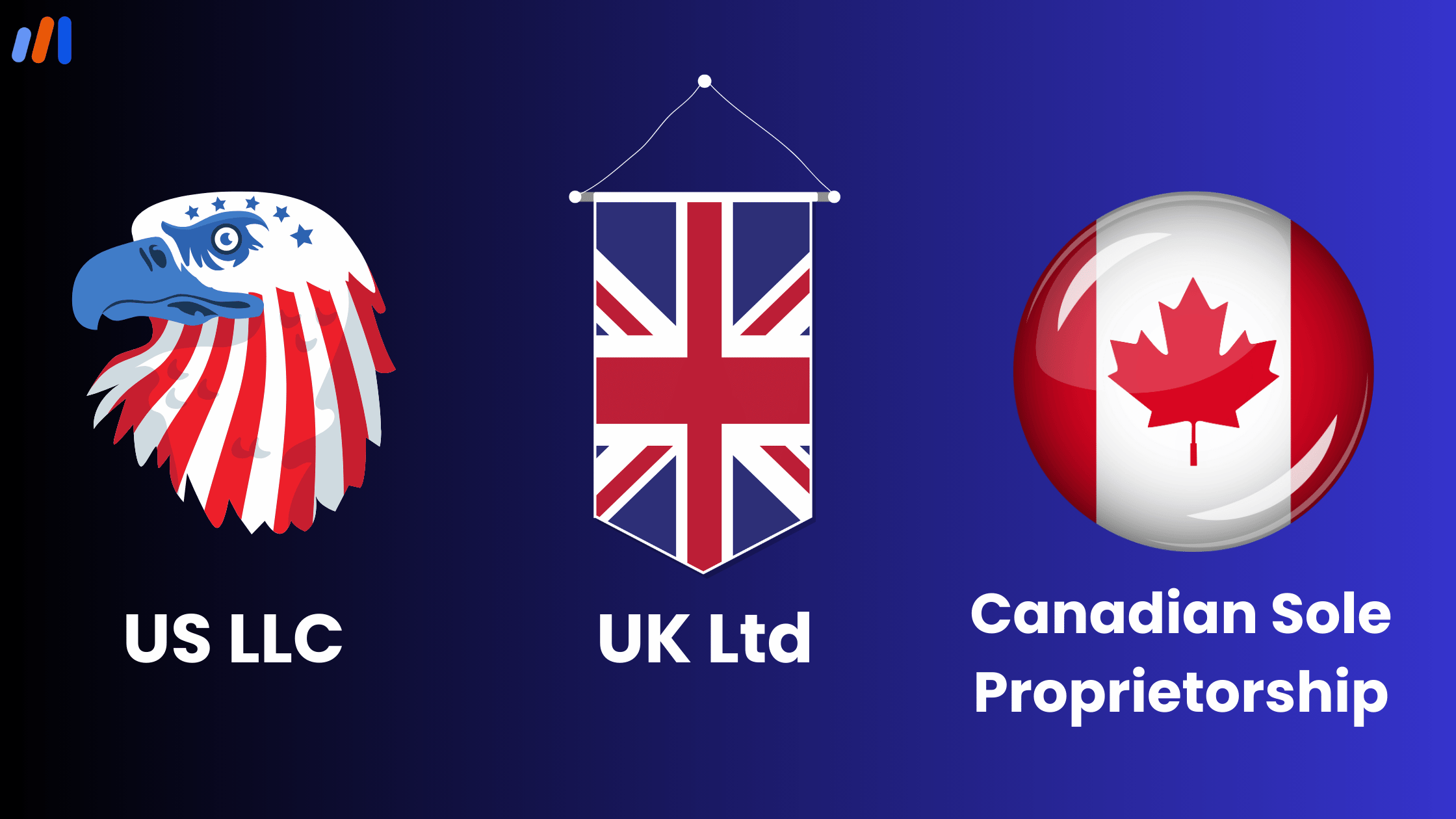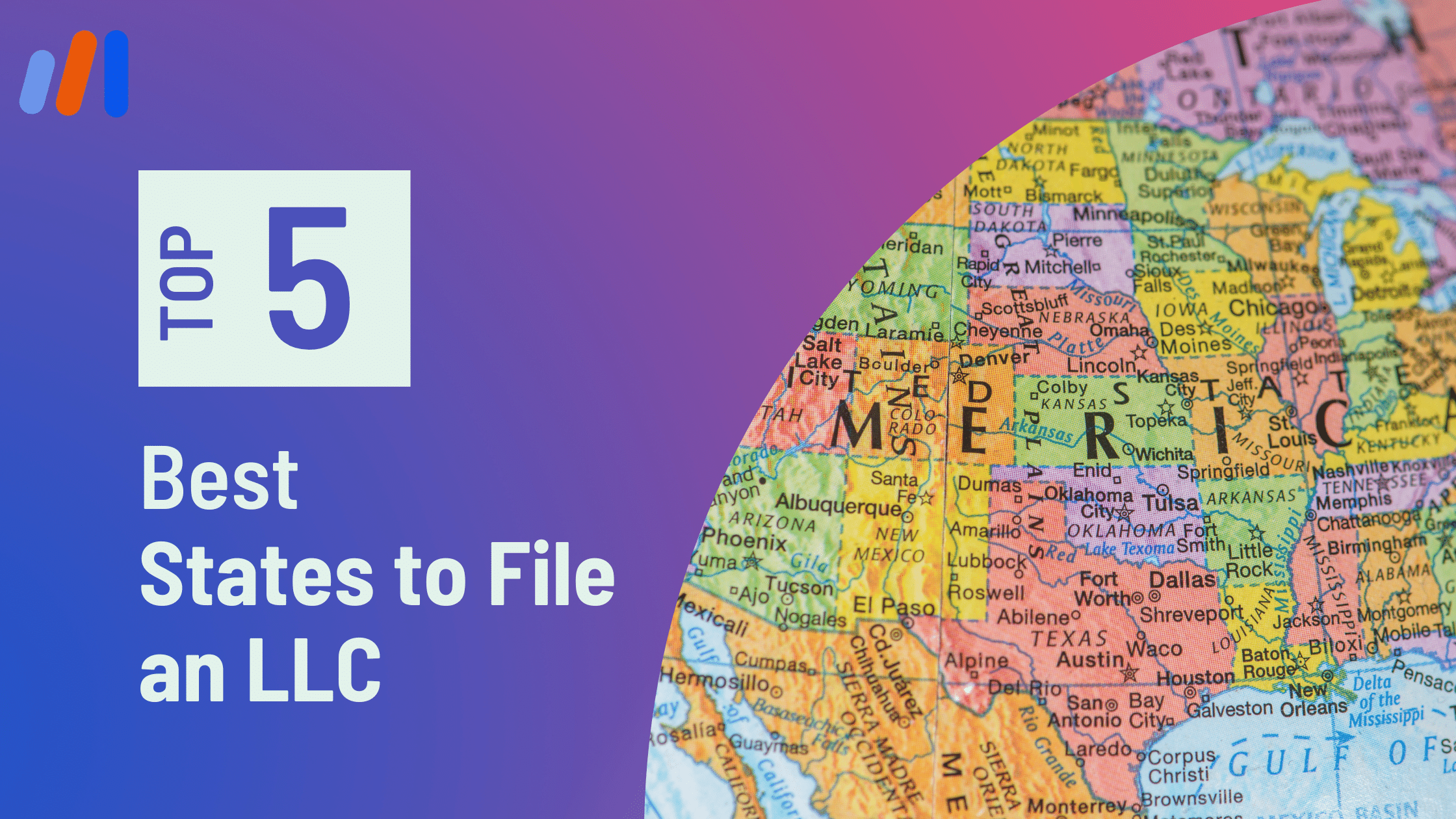The right legal structure is crucial in starting a business because it affects your day-to-day operations, taxes, and liability.
A Sole proprietorship, partnership, corporation, or limited liability company has its own rules, responsibilities, and benefits. This choice also has implications that extend far beyond mere compliance issues or immediate administrative obligations by businesses including the means through which capital is sourced as well as the taxation of profits.
It is crucial to take time to research exhaustively on these options as a way of setting the base for the future success and sustainability of the business. In this piece, we will compare three common types of business entities across different countries namely LLC, Ltd, and Sole Proprietorship (in the United States of America, United Kingdom, and Canada) so that you can be better placed to decide what best suits you to your goals in that line.
Overview of Business Entities
US LLC (Limited Liability Company)
A lawsuit filed against an American Limited Liability Company (LLC) does not target individuals having shares but the entity itself. Consequently, members are protected from personal liabilities attached to debts incurred by their organization; this implies that the former’s assets cannot be sequestrated by the latter’s creditors. The smallness of such businesses often makes them popular since they do not require complex formation processes or annual reporting; additionally, they can choose their tax treatment like sole proprietorships or corporations hence reducing tax expenses.
UK Ltd (Private Limited Company)
A UK Ltd company is a privately owned entity whose shareholders’ liability is confined within the amount invested in the company’s shares. This is similar to US Corporations although regulatory requirements are much more simplified here. This structure will suit companies planning for growth, attracting investment, or creating a strong brand presence because it allows the issuance of shares thereby raising confidence among potential shareholders or customers.
Canadian Sole Proprietorship
Canadian Sole Proprietorship refers to situations where one person owns and runs a firm. In this case, there is no legal distinction between the owner and the business which makes it relatively easy to run but exposes them to unlimited personal liability. Consequently, the owner is personally responsible for all debts and obligations incurred by a company thereby making it very risky particularly during expansion stages.
Key Features
US LLC
Liability protection: Non-business assets of members cannot be touched by liabilities in their commercial entity.
Tax flexibility: An LLC can be taxed as a sole proprietorship, partnership, S corp, or C corp depending on its financial circumstances and hence being able to have a tax plan that suits its needs.
Management flexibility: The structure of management can be member-managed or manager-managed thus allowing customization in decision-making procedures.
Formation requirements: Creating an LLC involves filing Articles of Organization and obtaining appropriate licenses which may differ between states.
UK Ltd
Liability protection: Shareholders’ funds are secured from liabilities beyond their contributed capital at risk level; this also prevents joint savings from being destroyed because of business losses.
Taxation: Corporate income tax applies to companies’ profits while dividends are taxed at the level of shareholders implying more complex tax planning.
Regulatory Requirements: Annual accounts must be filed with Companies House by relevant legislation resulting in greater transparency according to law.
Formation Requirements: Registration with Companies House and drafting a Memorandum of Association are necessary steps for establishing a Ltd company.
Canadian Sole Proprietorship
Liability: This means the owner’s assets are on the line if the company has debts since they have unlimited liability when it comes to business debt.
Taxation: So long as the income of this company is created, it is filed in an individual tax return by the owner thus simplifying taxation while increasing personal tax liability.
Simplicity: There are very few regulations surrounding this structure and so many entrepreneurs go for it because of that.
Formation Requirements: You can usually just register your business name with provincial authorities and get down to business.
Comparing Business Entities: US LLC vs UK Ltd vs Canadian Sole Proprietorship
| Aspect | US LLC | UK Ltd | Canadian Sole Proprietorship |
| Legal Structure | Limited Liability Company | Private Limited Company | Sole Proprietorship |
| Liability | Limited to the company’s assets | Limited to the company’s assets | Unlimited personal liability |
| Formation Requirements | Articles of Organization, Fees | Articles of Association, Fees | Minimal formalities |
| Management | Managed by members or managers | Managed by directors | Managed by the sole proprietor |
| Taxation | Pass-through taxation | Corporation tax | Personal income tax |
| Regulatory Compliance | Moderate | High | Low |
| Continuity | Perpetual existence | Perpetual existence | Ends with the proprietor’s death |
| Ownership | Unlimited members | Minimum one shareholder | Single individual |
| Capital Raising | Contributions from members | Issuance of shares | Limited to proprietor’s resources |
| Profit Distribution | Distributed to members | Dividends to shareholders | All profits to the proprietor |
| Annual Reporting | Required | Required | Not Required |
| Name Requirements | Must Include “LLC” or “L.L.C.” | Must include “Ltd” or “Limited” | No specific requirement |
| Privacy | Members’ names may be public | Directors’ and shareholders’ names may be public | The proprietor’s name is public |
| Operating Agreement | Strongly recommended | Articles of Association mandatory | Not required |
| Ease of Setup | Moderate | Moderate to complex | Simple |
Pros and Cons
US LLC
Advantages:
- Limited liability protection is offered which reduces personal risks.
- Tax flexibility that allows for tax planning for business financial needs.
- A simplified management structure promotes efficient decision-making.
Disadvantages:
- The setup costs may be higher than those of sole proprietorships depending on the state fees.
- Obligations to maintain ongoing compliance with the state consume time and effort in administration.
UK Ltd
Advantages:
- Shareholders have limited liability which guards their assets.
- This adds credibility for investors and clients thus building trust between them and a company.
- Equity-based capital raising can easily be done hence facilitating the growth of a firm.
Disadvantages:
- It takes much more reporting and complying with regulations that are time-consuming as well as complicated in nature.
- Corporate taxes and double taxation via dividends may affect the profitability of this business entity type.
Canadian Sole Proprietorship
Advantages:
- Easy and inexpensive to establish, making it accessible for many entrepreneurs
- One person owns all decisions about the business hence swift action can be taken when needed
- Streamlined tax filing process saves time, money, headache
Disadvantages:
- As the business grows unlimited personal responsibility could represent significant risk factors.
- Compared to other forms of organization, it is difficult to raise capital limiting growth potential.
- An informal structure might lack credibility with bigger customers or shareholders.
Suitable For
US LLC
An LLC is perfect for small and medium-sized businesses that require limited liability protection but do not want complex corporate structures or high taxes. In cases where they have several business interests while still securing their wealth from creditors, then this suits such people best.
UK Ltd
This arrangement is most preferred by firms aiming at great heights, attracting investment as well as creating credibility among its owners without exposing them to unlimited liability. It works especially well when a startup seeks external funding to grow further beyond the infancy stage.
Canadian Sole Proprietorship
A sole proprietorship would be the best fit for anyone interested in starting a small-scale business with low risk and very minimal start-up capital. It fits those who value ease of operations, and control and do not wish to comply with many regulatory requirements.
Conclusion
The right choice of business entity depends on what you need as an entrepreneur and the legal framework within which you operate. A US LLC for flexibility and liability protection; a UK Ltd for growth; Canadian Sole Proprietorship that has no corporate formalities at all.
Regardless of your intentions securing freedom from personal liabilities as in the case of US LLC, building brand credibility and attracting investors such as in UK Ltd or simply making life easier by not having to file any complicated paperwork like in a sole proprietorship, you will have some advantages provided that there are also certain drawbacks.
It is important to examine your enterprise goals along with the compliance environment. Easyfiling helps you understand how well a given structure aligns with your overall vision for a successful company.
FAQ (Frequently Asked Questions)
What are the tax implications of each kind?
US LLC: Usually taxed as a partnership having profits or losses allocated among members’ returns.
UK Ltd: Its profits attract corporate taxes while shareholders might pay dividends tax too.
Canadian Sole Proprietorship: Profit becomes the owner’s income with business income being reported on his/her return.
Which one works best for small firms?
US LLC is ideal for those seeking liability protection and tax flexibility.
UK Ltd is suitable for businesses wanting a clear separation between personal and business finances and those planning to raise capital through shareholders.
Canadian Sole Proprietorship is perfect for individuals wanting simplicity and full control without the need for extensive paperwork.
File Your LLC Today
25$ off with a coupon
Lock in EasyFiling's transparent rates and get lifetime compliance support at no extra cost.
Get Started Now







